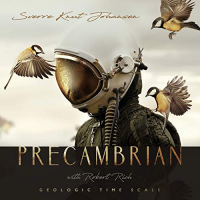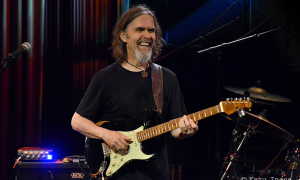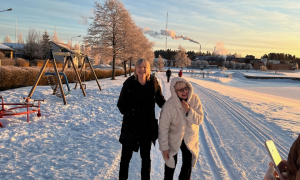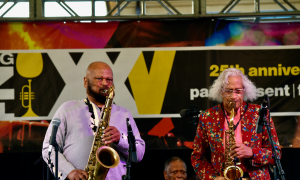Home » Jazz Articles » SoCal Jazz » Jeff Lorber: Chemistry in Fusion
Jeff Lorber: Chemistry in Fusion

Swing is one of those things you arrive at and can't be learned in a linear fashion.
—Jeff Lorber
Jeff Lorber
keyboardsb.1952
Fortunately for music listeners, Lorber's love of music, coupled with his innate musical skills, won out over his pre-med courses. Thus charting a course that has now spanned some forty years on the music scene. His band, Jeff Lorber Fusion, embraces an amalgamation of jazz and bebop genres that take the word fusion well beyond the standard perception of jazz/rock connectivity. In the following recent conversation, we talked about the variances and commonalties of his fusion endeavors, the ups and downs of his career, his fun and musical childhood, his life-threatening medical condition, his new and exciting project with

Mike Stern
guitarb.1953
All About Jazz: Although we all know you as an instrumental artist, I was just thinking back this morning of you being on American Bandstand with Dick Clark many years ago with a vocalist.
Jeff Lorber: Well, I should give you a little background to that. That band started out playing in Portland, Oregon, which was great because there were a lot of really great places to play. As it turns out, it was a great place to start a band. The people there supported local music and local jazz. There were some good musicians there that I was able to avail myself of. So, for about three or four years, we played mostly the Pacific Northwest. Mostly around Portland, but also Spokane, Seattle, Olympia, Salem, and all these other little towns. Then I put out an independent record and that got the attention of some major labels. That led to me signing with Arista. I put out a number of records for Arista and it was going very well as an instrumental group. Then, at some point, Clive Davis decided that he wasn't interested in jazz. He basically got rid of the entire jazz department at a certain point. Before that happened, I was on maybe my sixth record for Arista, and he really wanted me to start using vocals. If I had the hindsight I do now, I would realize that it wasn't necessarily such a good idea because I was a jazz artist and doing the vocal thing might just lose all my fans. Which is kind of what happened. So, basically all the TV shows we did with the vocalists was at the behest of Clive Davis. It was interesting in that I sort of switched careers for a while, becoming a studio musician in Los Angeles. Between 1986 and 1994, I didn't really put out any records. I did learn a lot about producing records in working with many great record producers. It turned out to be very positive in that way. It was a great learning experience, but eventually I got sort of tired of not having creative control. So, I started back into my recording career, which I am very happily still doing.
AAJ: At the outset that seems strange that Clive Davis would axe jazz. But that had to be about record sales, yes?
JL: Yeah, I guess. He was focused on vocal artists on the label such as Whitney Houston and other big sellers they had. When the crash happened, it was the jazz and classical divisions that were the first thing to go with all the major record labels. That's the way it goes sometimes. It's a fashion industry. So, you have to be in fashion. Every musician learns from the school of hard knocks.
AAJ: So, going the vocalist route was something you didn't really want to do but more or less had to?
JL: If I wanted to have my records promoted or, frankly, even to be able to record them I had to do it the way Clive Davis wanted it. Clive was very hands on. That was his style. Before he would let me record, I would have to bring demos in, and he had to like what he heard. That's kind of good in a way. That shows that you are involved and a certain quality control to a degree. But then there are labels like Warner Brothers that sign all these fantastic acts and then leave them alone to be creative. That works out better I would say.
AAJ: One positive, it would seem, is that even though you lost your fan base at one time, you later found out just how much your instrumental music is really working when your fans came back and then some.
JL: Yes. Absolutely right. When we play our shows, there are always people coming up to me and talking about those early Arista records. Those people still support the music when we come to town.
AAJ: Now the

Brecker Brothers
band / ensemble / orchestraJL: Yes, they are. And so is saxophonist

Andy Snitzer
saxophone
Marc Copland
pianob.1948
AAJ: I know you grew up listening to your mom play the piano and obviously were influenced by that. What songs or what type of music was she playing?
JL: She played mostly romantic music. Some Chopin and "Rhapsody in Blue." Beautiful music. I just loved it. It just seemed like fun and I wanted to get into it. As soon as I was big enough to play the piano, I started to take lessons. It became clear pretty quickly that I had a good ear and that I could figure things out. I didn't become the best reader, but I could hear what was going on. I knew I really liked it.
AAJ: I'm sure there was other music going on in the household as well.
JL: My older sisters were really into folk music.

Bob Dylan
guitar and vocalsb.1941

John Coltrane
saxophone1926 - 1967

John Mayall
harmonica1933 - 2024

Paul Butterfield
harmonica1942 - 1987
AAJ: (Laughing) Yes, I recall those days as well.
JL: They weren't really paying attention. It worked for me!
AAJ: Growing up in our era, you had to also be exposed to

The Beatles
band / ensemble / orchestraJL: I have to say that to this day that I am a huge, huge, Beatles fan. I just love their music so much. But when they first came out, I had two older sisters, and you know if my sisters liked them, then I just couldn't.
AAJ: Ah yes, having to be contrary, of course (laughing).
JL: (laughing) Yeah, but then I heard this record called "You Can't Do That" and that sold me.
AAJ: Oh yeah, what a great tune.
JL: Yeah, they made a great impression on me. When I was in high school all this great music was coming out. But whenever a Beatles record would come out everything would just stop. You would do nothing but listen to that record over and over again.
AAJ: Yes, I remember when The White Album came out. It was very much like that.
JL: Yeah man, just incredible. But then there was all this other stuff like

The Doors
band / ensemble / orchestrab.1965

Herbie Hancock
pianob.1940

Chick Corea
piano1941 - 2021

Red Garland
piano1923 - 1984

Wynton Kelly
piano1931 - 1971

Miles Davis
trumpet1926 - 1991

John Scofield
guitarb.1951
AAJ: Congratulations on winning a Grammy for Prototype. How did it feel to hear your name called out?
JL: Thank you. Well, I had been nominated a few times, so I didn't expect to win. But by the same token, I felt like I had as good a chance as I ever had. Sometimes there would be one guy on the list that was just the favorite, or two smooth jazz albums would cancel each other out or whatever like that. But anyways, yeah, it was great. The Grammys were in New York that year. They are usually in Los Angeles, so it had a whole different feel to it. It was at Madison Square Garden. We had a good time.
AAJ: Do you feel sometimes like it is a bit random? I mean, you had done other albums previously that had the goods and indeed were nominated. Then your follow up to Prototype, Impact, in my estimation, is at least as good as Prototype.
JL: I agree with you there. I think that is a solid record. You're right that sometimes it can be right place at the right time.
AAJ: Most fusion artists, or really any artists, have a signature recognizable sound. There is a sound that comes into your head immediately if someone says

David Sanborn
saxophone1945 - 2024

Led Zeppelin
band / ensemble / orchestrab.1968

Pink Floyd
band / ensemble / orchestrab.1964
JL: I would say it is more of the latter. It kind of worked out that way. All those things that you mentioned are all my point of view. Melodies are important. Cool changes are important. Funky grooves are important. Those are some of the things you are always going to hear in my music. I always try to listen to what is going on now and try to find things that are new and interesting. Stuff that I can kind of play with and put into my laboratory. Then put my approach to it and see what comes out. I think that is something that helps keep me inspired and hopefully keeps my music fresh. One thing I do is to listen to the new music Friday on Spotify. I listen to it every week. Usually like maybe two hundred songs. If I am lucky, I hear three to six or seven songs that for some reason or another inspire me. Whether it's a cool groove or some cool changes. I just listen and I think eventually some of those ideas sort of filter though. I'm also a fan of old music. I have a very large collection of R&B, jazz, and fusion artists that I listen to on a regular basis. I get as much inspiration from listening to that as I do from the new stuff.
AAJ: Which artists are among those favorites from the past?
JL: Well, certainly Herbie. Starting, in particular, with the

The Headhunters
band / ensemble / orchestrab.1973

Keith Jarrett
pianob.1945

Joe Henderson
saxophone1937 - 2001

Weather Report
band / ensemble / orchestra
Return to Forever
band / ensemble / orchestra
Led Zeppelin
band / ensemble / orchestrab.1968
AAJ: That includes the multi rooted Jazz, Funk, Soul trilogy (to date) records with

Everette Harp
saxophoneb.1961

Chuck Loeb
guitar1955 - 2017

Paul Jackson Jr
guitarb.1959
JL: Paul and i have worked since the early '80s as rhythmic section mates on R&B and pop records. So we have a great chemistry playing together in that way. We lock into some great rhythms together. Paul is one if the most recorded guitarits in studio work history and has a very recognizable sound.
AAJ: Chuck's loss is of course a sad one for the jazz world. Tell us about him in relationship to playing and working together.
JL: What Chuck and I mostly had in common is that we both focused a lot on writing and producing other artists. Chuck loved bebop and was incredibly proficient at playing standards, His writing showed a fantastic freedom with jazzy chromatic harmonies. He had a jazzier approach to rhythm where as he would lay out if I was playing rhythm. So both incredible guitarists, but very different in approach.
AAJ: I mentioned He Had A Hat. That's a strong transitional record.
JL: I made that record with my buddy Bobby Colomby. He had a lot to do with the writing and the direction. He pushed it into a jazzier feel. His main focus was that every song had to have some hip changes. We still play a bunch of songs from that album when we play live. We were fortunate to have a lot of great talent on that record.

Hubert Laws
woodwindsb.1939

Gerald Albright
saxophone, altoAbe Laboriel, Jr.
drums
Brian Bromberg
bassb.1960

Vinnie Colaiuta
drumsb.1956
AAJ: So where did the name He Had A Hat come from?
JL: That's from the old joke. Are you familiar with that?
AAJ: No, I don't believe so.
JL: Well, the joke is that a Jewish grandmother goes to the beach with her daughter's son to take care of him and make sure nothing happens to him. A huge wave comes up and grabs Mikey and he disappears. Of course, the grandmother is distraught and looks at the sky and says. "Please God I will do anything, I will dedicate my life to being a better person, I will feed the poor, I will do anything just please, please, bring him back to me." All of a sudden there is another wave and Mikey is deposited back on the beach. She looks up at the sky and says, (Lorber now laughing) "He had a hat!"
AAJ: (Laughing out loud) Oh, that's very funny. Comes under the heading that some people are never satisfied. That's great. So changing gears, at one time you were pre-med at Boston University. So, in an alternate universe perhaps I would be speaking with Dr. Jeff Lorber?
JL: Well, maybe. I had talent for music. Chemistry was a lot harder. I had to stay up all night. I got through it, but not easily. Eventually when I moved to the Portland area the music scene was just so strong that I just sort of ditched the whole chemistry thing. In the big picture I think it helped me out because now in being a musician there is so much technology involved. Especially on the recording side. Figuring out the software and grasping it all, I believe, is easier with that training I had. It gave me a scientific approach to things. I think that indirectly that training has helped me out on the technology side.
AAJ: On the medical forefront, a few years back you suffered a life-threatening situation. I think it is very important that people know about PKD. If you don't mind sharing and talking about that and helping to create more awareness about it.
JL: Yeah, although a lot of people have PKD, which is polycystic kidney disease, it doesn't receive the publicity that it should. Especially when you consider that there are two hundred thousand people that have this disease, many of whom are on dialysis. It's one of those things where people look okay, so you think that maybe they aren't sick. But their kidneys are failing, and they are on dialysis. I was very fortunate to get a kidney transplant from my wife. That was nearly fifteen years ago, so I have been very lucky. I have been pretty much trouble free and been able to live a normal life. That's been a huge blessing and I am very grateful.
AAJ: PKD is a genetic condition?
JL: Yeah, my mom had it, and both of my daughters have it. The thing is that it doesn't necessarily affect you until you get to a certain age. My grandmother was lucky. My mom's mom lived into her eighties with her kidneys still working. With my mom, it affected her in her mid-forties. It's kind of a genetic programming mistake and what happens is that it starts to make cysts. Eventually those cysts grow, and they inhibit your kidney from functioning properly. So that's the deal. I was very lucky to get a transplant.
AAJ: What is being done to eradicate or better treat this condition?
JL: There is a PKD Foundation that has many people working on experiments and research. I very much support that organization. Unfortunately, there hasn't been any huge breakthroughs yet, but there are many things that are in the offering for the future. So, of course, we have a positive outlook and are very hopeful for that.
AAJ: Well, let's hope so. To be honest, I only recently became aware of PKD. I felt like it was important to get that message and information out there, so I very much appreciate you talking about it.
JL: Well, I appreciate that you are doing that. That's really great. Thank you for that.
AAJ: Getting back to your music. As if you don't have enough going on, I do believe you have a project with

Mike Stern
guitarb.1953
JL: As a matter of fact, we just wrapped up the last song today. We were supposed to hand it in today, but that's not going to happen. But most certainly by next week. It's really been fun. It's really been different to work with Mike. Mike has much more of a rock and bebop edge than I normally do. I mean Mike is really a badass player. He is kind of on the left and the right of what I normally do, so, yeah, it's been a whole lot of fun working with him. We have a whole bunch of dates coming up and I am really looking forward to playing with him.
AAJ: Yeah, badass is about right to describe Stern. A phenomenal cat. Big fan of his music and of

Leni Stern
guitar, electricJL: Oh well, Leni is on one song on the record too. A very beautiful piece that has kind of a modal type of sound. As for Mike, you are probably familiar with an album he did with The Yellowjackets a few years back.
AAJ: Yes, Lifecycle. A very nice record.
JL: Yeah, it was very successful and a fun record. So sometimes he is looking to reinvent himself. This has been a challenge and it's been fun. Everybody I have talked to about it has become immediately interested and knew it would be something different and cool.
AAJ: So, with

Dave Weckl
drumsb.1960

Jimmy Haslip
bassb.1951
JL: Yes, I wrote six songs and Mike wrote five. Actually, most of my songs I co-wrote with Jimmy Haslip. It's an eleven-song album that we coincidentally are calling 11.
AAJ: When does that come out?
JL: I believe in September.
AAJ: Well, we will seriously be looking forward to that and your tour. I saw you play just a few years ago in LA at the Baked Potato with Haslip,

Gary Novak
drums
Bob Reynolds
saxophone, tenorb.1977
JL: Oh yeah, it's great. I mean, you know, that place is legend. It's a different kind of thing to go there. It's very relaxed and no real pressure. It's a laboratory where we can find new things. I like that place, really glad that it is there.
AAJ: You have played and recorded with Haslip a lot over the years. Maybe you could talk a bit about the musical chemistry you share.
JL: I am very detail oriented and Jimmy is more of the big picture kind of guy. So that works well for us. I really trust his instincts and musical judgment. When we are kicking around ideas for a new record Jimmy is not afraid to let me know if there is something he doesn't like for some reason. So, with that honesty, I can really trust his judgment. Sometimes, too, it is nice not to have all the responsibility. To have someone that you respect that you can bounce ideas off of. And then there is the fact that he can flat out play. He is an incredible soloist. We kind of changed it up and have been doing a lot of trio gigs over the past couple of years. He really helps make that work with any of the drummers we play with. The trio thing is what Jeff Lorber Fusion is really all about.
AAJ: What are the biggest differences between playing years ago when you first started out and playing now?
JL: I remember one time, way back, we were opening for

Mose Allison
piano and vocals1927 - 2016
AAJ: That's never good.
JL: Yeah, well, that school of hard knocks thing again. I was just getting going and experimenting with different sax players and even had a guitarist for a while. It took some time to really find the right sound. Then, of course, now I am playing with Weckl and all these top shelf players. Still, I listen back to some of the records we made way back in the day, and it is remarkable how really good much of it sounds. There was something about the energy and the tightness we had back then. None of us were world-class musicians at that time, but we did play a lot. We got tight, and you can hear that on the records.
AAJ: Sometimes it's more about the feel, the energy, and having a good time. That translates over to the listener.
JL: It's the spirit, yeah. When you play a lot live, you find a way to really hear each other and cement the sound. It really works.
AAJ: And it no doubt continues to work. Jeff, it has been a lot of fun talking to you this morning. I appreciate it very much. Looking forward to hearing the new record with Mike Stern, 11, in September, and catching part of the tour in LA and/or Phoenix in December.
JL: Outstanding. Fantastic. Enjoyed talking with you as well, Jim. See you in December.
Photo credit: Marina Chavez
Tags
Jeff Lorber
Jeff Lorber Fusion
Mike Stern
Clive Davis
Los Angeles
Philadelphia
Andy Snitzer
Marc Copland
Jimmy Haslip
Arista
Comments
PREVIOUS / NEXT
Jeff Lorber Concerts
Nov
14
Fri
Jazz Funk Soul with Jeff Lorber, Everette Harp & Paul...
Keystone Korner BaltimoreBaltimore, MD
Nov
14
Fri
Jazz Funk Soul with Jeff Lorber, Everette Harp & Paul...
Keystone Korner BaltimoreBaltimore, MD
Nov
20
Thu
Thu, Nov 20 | Jeff Lorber | 6:30pm Show
South Jazz ClubPhiladelphia, PA
Support All About Jazz
 All About Jazz has been a pillar of jazz since 1995, championing it as an art form and, more importantly, supporting the musicians who make it. Our enduring commitment has made "AAJ" one of the most culturally important websites of its kind, read by hundreds of thousands of fans, musicians and industry figures every month.
All About Jazz has been a pillar of jazz since 1995, championing it as an art form and, more importantly, supporting the musicians who make it. Our enduring commitment has made "AAJ" one of the most culturally important websites of its kind, read by hundreds of thousands of fans, musicians and industry figures every month.
Go Ad Free!
To maintain our platform while developing new means to foster jazz discovery and connectivity, we need your help. You can become a sustaining member for as little as $20 and in return, we'll immediately hide those pesky ads plus provide access to future articles for a full year. This winning combination vastly improves your AAJ experience and allow us to vigorously build on the pioneering work we first started in 1995. So enjoy an ad-free AAJ experience and help us remain a positive beacon for jazz by making a donation today.

Los Angeles
Concert Guide | Venue Guide | Local Businesses
| More...







 Buy Now
Buy Now





















